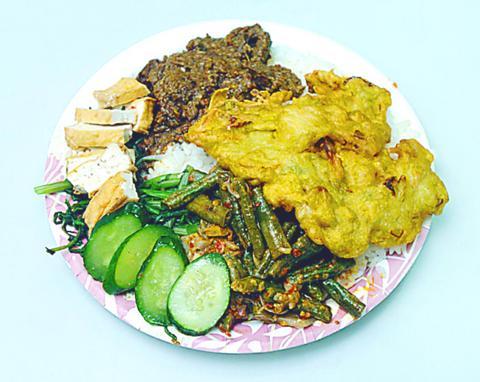Taipei's boxy train station seems unlikely to house adventure, but it does -- and like Alice falling down the rabbit hole, a few steps in an unexpected direction land visitors in a faraway place.
This time the direction is upward, away from the trains and into the vast Golden Square, located on the second floor but also somewhere between late-disco-era 1980 and Southeast Asia.

PHOTO: CHIANG
With its pitiless florescent lighting and aromatic buffets, this outpost of Jakarta and Manila is not an oriental fantasy of costume or decor but the average folks' mall, complete with record shops blaring dangdut, groceries selling spices and antibiotics by the pill, clothing shops with elaborately embroidered barongs -- and, best of all, restaurants.
Ignore the ugly food court, it's the four Indonesian and Philippine restaurants in the building's corners that are cheap and authentic. Their clientele are mostly foreign workers, who pack the station on Sundays.
Restoran Indorasa offers herb-tangy beef rendang and various vegetables in coconut milk, fresh and blanched vegetables to drizzle with gado-gado, sauce of peanuts and herbs, curried eggs, tofu, breadfruit, vegetable fritters and many other dishes.
Presentation is basic, with dishes on the steam table or tepid on the counter, but the rice is hot and the chilis and lemon grass add sinus-clearing warmth to the buffet of stews.
Indorasa seems to charge by the dish, so taking a bit of everything set me back NT$200, while biandang lunchboxes with only three dishes were NT$120.
Beyond Indorasa there are two other Indonesian cafes (an excellent one opens up only on Sundays for the crowds) and a Philippine place, Mercedita. The presentation is more thoughtful at the latter: for takeout they pack the stews in tubs (no spilling/soggy cardboard boxes) and put a neat melon-shape of molded rice in a separate box.
The bad news is that its chicken adobo is only bony chopped wings and the dinuguaan (pork cooked in an inky blood-and-vinegar sauce) has chewy arteries instead of meat. Mercedita also offers halo-halo, which means "mix-mix" and is the substantial Philippine ice dessert, tending toward syrupy coconut strings, beans, jackfruit and other goodies. Also, on Sundays, you can go to Cosmos Filipino Goods and get desserts that travel better: maja blanca (a coconut and corn pudding) and sweet sticky rice.
Two of the other cafes fed me fulsomely for NT$80 each so it's hard to go wrong, particularly when what you see is what you get -- no menus mean no language barrier.
So fall up the rabbit hole and visit Southeast Asia in downtown Taipei for a quick bite or memorable picnic provisions.

Next week, candidates will officially register to run for chair of the Chinese Nationalist Party (KMT). By the end of Friday, we will know who has registered for the Oct. 18 election. The number of declared candidates has been fluctuating daily. Some candidates registering may be disqualified, so the final list may be in flux for weeks. The list of likely candidates ranges from deep blue to deeper blue to deepest blue, bordering on red (pro-Chinese Communist Party, CCP). Unless current Chairman Eric Chu (朱立倫) can be convinced to run for re-election, the party looks likely to shift towards more hardline

Last week the story of the giant illegal crater dug in Kaohsiung’s Meinong District (美濃) emerged into the public consciousness. The site was used for sand and gravel extraction, and then filled with construction waste. Locals referred to it sardonically as the “Meinong Grand Canyon,” according to media reports, because it was 2 hectares in length and 10 meters deep. The land involved included both state-owned and local farm land. Local media said that the site had generated NT$300 million in profits, against fines of a few million and the loss of some excavators. OFFICIAL CORRUPTION? The site had been seized

Sept. 15 to Sept. 21 A Bhutanese princess caught at Taoyuan Airport with 22 rhino horns — worth about NT$31 million today — might have been just another curious front-page story. But the Sept. 17, 1993 incident came at a sensitive moment. Taiwan, dubbed “Die-wan” by the British conservationist group Environmental Investigation Agency (EIA), was under international fire for being a major hub for rhino horn. Just 10 days earlier, US secretary of the interior Bruce Babbitt had recommended sanctions against Taiwan for its “failure to end its participation in rhinoceros horn trade.” Even though Taiwan had restricted imports since 1985 and enacted

Enter the Dragon 13 will bring Taiwan’s first taste of Dirty Boxing Sunday at Taipei Gymnasium, one highlight of a mixed-rules card blending new formats with traditional MMA. The undercard starts at 10:30am, with the main card beginning at 4pm. Tickets are NT$1,200. Dirty Boxing is a US-born ruleset popularized by fighters Mike Perry and Jon Jones as an alternative to boxing. The format has gained traction overseas, with its inaugural championship streamed free to millions on YouTube, Facebook and Instagram. Taiwan’s version allows punches and elbows with clinch striking, but bans kicks, knees and takedowns. The rules are stricter than the